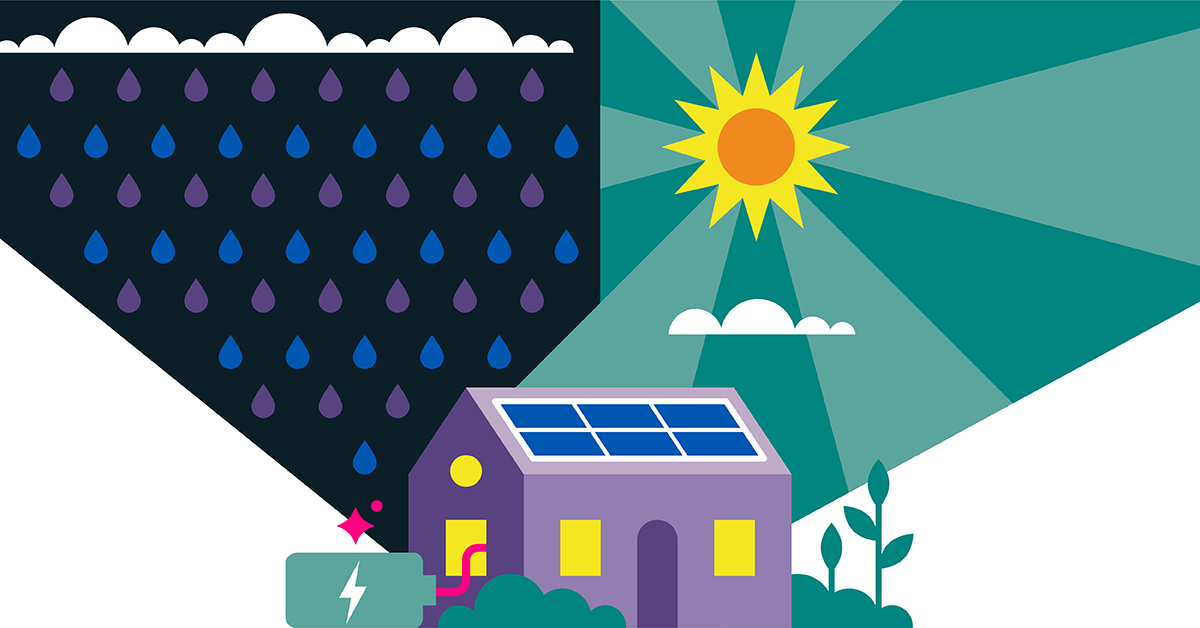Are batteries the future of home energy?
If you’re considering having solar panels installed at home, or have already started generating your own renewable energy, you’ll want to do so as cost-effectively and sustainably as possible.
A home battery, or an energy-storage system, ensures you’re getting the most from your energy by allowing you to benefit from renewable solar energy in all weather conditions. They store electricity produced in the home that cannot be used, and are a sustainable way to reduce your energy bills and carbon emissions, by reducing your reliance on the national grid.
Around 700,000 homes in the UK have solar panel energy, according to Energy Saving Trust, and installing home batteries could be the next big step for all homes.
How do home batteries work?
Solar panels can’t produce energy at night, nor do they store the energy they generate to use at these times. This means that when your panels aren’t producing energy, you must buy it from elsewhere. On top of this, any excess energy generated in the day is exported back to the grid.
If you use lots of energy at night-time, this may leave you wondering if solar panels are right for you and your energy needs.
That’s where home batteries come in. Batteries make better use of the energy you are generating, by storing the electricity produced in the day for use at another time. So, they increase the suitability and appeal of solar as an energy source.
.png?width=300&name=Are%20batteries%20the%20future%20of%20home%20energy%201%20(1).png)
The capacity of a home energy battery can vary, from 1kWh to 13.5kWh for a top-of-the-range Tesla Powerwall, so system size can also vary accordingly.
Although many companies offer solar and storage as a complete package, harnessing energy from the sun isn’t the only reason to install a home battery. If you generate renewable electricity from other technologies, such as wind or hydro energy, you can also use a home battery to store it up.
A home battery comes into its own when combined with the right energy tariff, namely time-of-use tariffs which price electricity different depending on the time of day. Households can charge up the battery at night when electricity from their supplier is typically cheaper, and use it at peak times throughout the day.
How do you know if a home battery is right for you?
Firstly, if you’re considering a battery, it’s important to calculate how much of the energy you currently produce at home you are actually using. If you are able to use your solar energy to power your appliances during the day and do not have to pay for extra electricity, then a home battery may not be necessary right now.
On the other hand, if you are out of the house during the day and power a lot of your appliances at night, a battery could help you make the most out of your renewable energy generation.
Costs versus benefits
Buying and installing a battery can be costly. According to Energy Saving Trust, the initial cost of batteries ranges from £4,000 to £6,000, including VAT. This bill rises to around £22,800 if you also include the cost of solar panels, an inverter and installation costs.
Yet, the benefits of a battery are clear: you can more of your renewable energy, meaning cheaper energy bills, as you’ll buy less electricity from your supplier.
There’s no doubt though that energy-storage systems are a long-term investment, so it’s important to weigh up the financial benefits before you purchase.
.png?width=300&name=Are%20batteries%20the%20future%20of%20home%20energy%202%20(1).png)
Thankfully, help is at hand. Loop's new Solar and Battery Simulator enables you to calculate how much solar and battery installations would cost you before actually taking the leap and installing them. The simulator uses details about your house, your own patterns of energy usage and solar yield based on actual weather data. You are also able to see the impact of fitting different capacities of home battery to assess whether that makes solar work for you.
What does the future look like?
Home battery technology is still relatively new and the range of home battery products and providers is a limited. But there is a growing list of providers, including the likes of Nissan, LG, Tesla and Powervault.
And interest in home batteries is growing. A 2019 survey by Which? showed that 80% of solar panel owners had either already owned a home battery or would consider buying one to accompany their solar system. This was up from 60% the previous year.
Further insight from the Which? 2019 survey revealed a third of battery owners had bought them in the last year, compared to just 18% who have owned a battery for over three years.
As the demand for energy-storage systems increase, the range of products available, and their affordability, is only likely to improve.
• • •
With Loop, you can find out how you use electricity, then make smart decisions about using less - click here to find out more. We have a risk-free, no-quibble, money-back guarantee as standard, so what's to lose...apart from some £££ from your bills and some weight from your carbon footprint?







